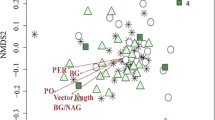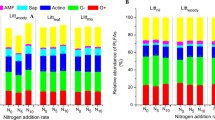Abstract
Leaching of water-soluble compounds is a dominant process during the first stages of litter decomposition, providing the microorganisms in the underlying soil with an important source of labile carbon and nutrients. Leachate composition (quantity and quality) can vary considerably among different plant species, but its consequences for soil microbially-driven processes remains largely unexplored. Here, we evaluated the differences in leachate quantity and quality from freshly fallen leaf litter of widely distributed coniferous and deciduous broadleaf tree species of European temperate forests, and their effects on soil microbial responses in a microcosm experiment under controlled conditions. Leachates of broadleaf litter contained higher amounts of carbon and nitrogen available for microbes, but with substantially higher aromaticity than leachates from coniferous litter. A one-time leachate addition to soils immediately increased soil microbial respiration with longer lasting effects of deciduous broadleaf compared to coniferous litter leachates leading to a microbial community with an apparently more efficient use of carbon. When leachates of different species were mixed, the observed microbial responses differed in some cases from that expected based on soils to which leachates from single species were added. These non-additive effects were partly explained by the functional dissimilarity of leachate traits, suggesting complementary resources for microorganisms when leachates of different species are available. Our data show that species-specific litter-derived leachates of varying quantity and quality and their mixtures distinctly affect soil microorganisms. In forest ecosystems with recurrent leaf litter inputs from the same species, such leachate effects may determine soil processes also in the longer term, controlling biogeochemical cycling to an important degree.




Similar content being viewed by others
References
Aiken G, Leenheer J (1993) Isolation and chemical characterization of dissolved and colloidal organic matter. Chem Ecol 8:135–151. doi:10.1080/02757549308035305
Ball BA, Hunter MD, Kominoski JS et al (2008) Consequences of non-random species loss for decomposition dynamics: experimental evidence for additive and non-additive effects. J Ecol 96:303–313. doi:10.1111/j.1365-2745.2007.01346.x
Barantal S, Schimann H, Fromin N, Hättenschwiler S (2014) C, N and P fertilization in an Amazonian rainforest supports stoichiometric dissimilarity as a driver of litter diversity effects on decomposition. Proc R Soc Lond B Biol Sci 281:20141682. doi:10.1098/rspb.2014.1682
Beare MH, Neely CL, Coleman DC, Hargrove WL (1990) A substrate-induced respiration (SIR) method for measurement of fungal and bacterial biomass on plant residues. Soil Biol Biochem 22:585–594. doi:10.1016/0038-0717(90)90002-H
Berg B, McClaugherty C (2008) Plant litter: decomposition, humus formation, carbon sequestration. Springer, Berlin. doi:10.1007/978-3-540-74923-3
Botta-Dukát Z (2005) Rao’s quadratic entropy as a measure of functional diversity based on multiple traits. J Veg Sci 16:533–540. doi:10.1111/j.1654-1103.2005.tb02393.x
Burghouts TBA, Van Straalen NM, Bruijnzeel LA (1998) Spatial heterogeneity of element and litter turnover in a Bornean rain forest. J Trop Ecol 14:477–506. doi:10.1017/S0266467498000352
Cleveland CC, Townsend AR (2006) Nutrient additions to a tropical rain forest drive substantial soil carbon dioxide losses to the atmosphere. Proc Natl Acad Sci USA 103:10316–10321. doi:10.1073/pnas.0600989103
Cleveland CC, Nemergut DR, Schmidt SK, Townsend AR (2007) Increases in soil respiration following labile carbon additions linked to rapid shifts in soil microbial community composition. Biogeochemistry 82:229–240. doi:10.1007/s10533-006-9065-z
Currie WS, Aber JD (1997) Modeling leaching as a decomposition process in humid montane forests. Ecology 78:1844–1860. doi:10.1890/0012-9658(1997)078[1844:MLAADP]2.0.CO;2
Don A, Kalbitz K (2005) Amounts and degradability of dissolved organic carbon from foliar litter at different decomposition stages. Soil Biol Biochem 37:2171–2179. doi:10.1016/j.soilbio.2005.03.019
Epps KY, Comerford NB, Reeves JB et al (2007) Chemical diversity—highlighting a species richness and ecosystem function disconnect. Oikos 116:1831–1840. doi:10.1111/j.2007.0030-1299.15853.x
Fanin N, Hättenschwiler S, Barantal S et al (2011) Does variability in litter quality determine soil microbial respiration in an Amazonian rainforest? Soil Biol Biochem 43:1014–1022. doi:10.1016/j.soilbio.2011.01.018
Fanin N, Fromin N, Buatois B, Hättenschwiler S (2013) An experimental test of the hypothesis of non-homeostatic consumer stoichiometry in a plant litter-microbe system. Ecol Lett 16:764–772. doi:10.1111/ele.12108
Fanin N, Hättenschwiler S, Fromin N (2014) Litter fingerprint on microbial biomass, activity, and community structure in the underlying soil. Plant Soil 379:79–91. doi:10.1007/s11104-014-2051-7
Fonte ES, Amado AM, Meirelles-Pereira F et al (2013) The combination of different carbon sources enhances bacterial growth efficiency in aquatic ecosystems. Microb Ecol 66:871–878. doi:10.1007/s00248-013-0277-1
Garnier E, Cortez J, Billès G et al (2004) Plant functional markers capture ecosystem properties during secondary succession. Ecology 85:2630–2637. doi:10.1890/03-0799
Gartner TB, Cardon ZG (2004) Decomposition dynamics in mixed-species leaf litter. Oikos 104:230–246. doi:10.1111/j.0030-1299.2004.12738.x
Gessner MO, Swan CM, Dang CK et al (2010) Diversity meets decomposition. Trends Ecol Evol 25:372–380. doi:10.1016/j.tree.2010.01.010
Grime JP (1998) Benefits of plant diversity to ecosystems: immediate, filter and founder effects. J Ecol 86:902–910. doi:10.1046/j.1365-2745.1998.00306.x
Hagedorn F, Machwitz M (2007) Controls on dissolved organic matter leaching from forest litter grown under elevated atmospheric CO2. Soil Biol Biochem 39:1759–1769. doi:10.1016/j.soilbio.2007.01.038
Handa IT, Aerts R, Berendse F et al (2014) Consequences of biodiversity loss for litter decomposition across biomes. Nature 509:218–221. doi:10.1038/nature13247
Hättenschwiler S, Jørgensen HB (2010) Carbon quality rather than stoichiometry controls litter decomposition in a tropical rain forest. J Ecol 98:754–763. doi:10.1111/j.1365-2745.2010.01671.x
Hättenschwiler S, Tiunov AV, Scheu S (2005) Biodiversity and litter decomposition in terrestrial ecosystems. Annu Rev Ecol Evol Syst 36:191–218. doi:10.1146/annurev.ecolsys.36.112904.151932
Joly FX, Coulis M, Gérard A et al (2015) Litter-type specific microbial responses to the transformation of leaf litter into millipede feces. Soil Biol Biochem 86:17–23. doi:10.1016/j.soilbio.2015.03.014
Kalbitz K, Solinger S, Park JH et al (2000) Controls on the dynamics of dissolved organic matter in soils: a review. Soil Sci 165:277–304. doi:10.1097/00010694-200004000-00001
Kalbitz K, Meyer A, Yang R, Gerstberger P (2007) Response of dissolved organic matter in the forest floor to long-term manipulation of litter and throughfall inputs. Biogeochemistry 86:301–318. doi:10.1007/s10533-007-9161-8
Keiblinger KM, Hall EK, Wanek W et al (2010) The effect of resource quantity and resource stoichiometry on microbial carbon-use-efficiency. FEMS Microbiol Ecol 73:430–440. doi:10.1111/j.1574-6941.2010.00912.x
Kiikkilä O, Kitunen V, Smolander A (2011) Properties of dissolved organic matter derived from silver birch and Norway spruce stands: degradability combined with chemical characteristics. Soil Biol Biochem 43:421–430. doi:10.1016/j.soilbio.2010.11.011
Kiikkilä O, Kitunen V, Spetz P, Smolander A (2012) Characterization of dissolved organic matter in decomposing Norway spruce and silver birch litter. Eur J Soil Sci 63:476–486. doi:10.1111/j.1365-2389.2012.01457.x
Kiikkilä O, Smolander A, Kitunen V (2013) Degradability, molecular weight and adsorption properties of dissolved organic carbon and nitrogen leached from different types of decomposing litter. Plant Soil 373:787–798. doi:10.1007/s11104-013-1837-3
Klotzbücher T, Kaiser K, Filley TR, Kalbitz K (2013) Processes controlling the production of aromatic water-soluble organic matter during litter decomposition. Soil Biol Biochem 67:133–139. doi:10.1016/j.soilbio.2013.08.003
Leenheer JA (1981) Comprehensive approach to preparative isolation and fractionation of dissolved organic carbon from natural waters and wastewaters. Environ Sci Technol 15:578–587. doi:10.1021/es00087a010
Manzoni S, Taylor P, Richter A et al (2012) Environmental and stoichiometric controls on microbial carbon-use efficiency in soils. New Phytol 196:79–91. doi:10.1111/j.1469-8137.2012.04225.x
Marschner B, Kalbitz K (2003) Controls of bioavailability and biodegradability of dissolved organic matter in soils. Geoderma 113:211–235. doi:10.1016/S0016-7061(02)00362-2
Michalzik B, Kalbitz K, Park J-H et al (2001) Fluxes and concentrations of dissolved organic carbon and nitrogen—a synthesis for temperate forests. Biogeochemistry 52:173–205. doi:10.1023/A:1006441620810
Neff JC, Asner GP (2001) Dissolved organic carbon in terrestrial ecosystems: synthesis and a model. Ecosystems 4:29–48. doi:10.1007/s100210000058
Qualls RG (2005) Biodegradability of fractions of dissolved organic carbon leached from decomposing leaf litter. Environ Sci Technol 39:1616–1622. doi:10.1021/es049090o
Qualls RG, Haines BL (1991) Geochemistry of dissolved organic nutrients in water percolating through a forest ecosystem. Soil Sci Soc Am J 55:1112–1123. doi:10.2136/sssaj1991.03615995005500040036x
R Core Team (2014) R: a language and environment for statistical computing. R Found Stat Comput Vienna, Austria. http://www.R-project.org/
Schlesinger WH, Andrews JA (2000) Soil respiration and the global carbon cycle. Biogeochemistry 48:7–20. doi:10.1023/A:1006247623877
Smolander A, Kitunen V (2002) Soil microbial activities and characteristics of dissolved organic C and N in relation to tree species. Soil Biol Biochem 34:651–660. doi:10.1016/S0038-0717(01)00227-9
Soong JL, Parton WJ, Calderon F et al (2015) A new conceptual model on the fate and controls of fresh and pyrolized plant litter decomposition. Biogeochemistry 124:27–44. doi:10.1007/s10533-015-0079-2
Townsend AR, Braswell BH, Holland EA, Penner JE (1996) Spatial and temporal patterns in terrestrial carbon storage due to deposition of fossil fuel nitrogen. Ecol Appl 6:806–814. doi:10.2307/2269486
Uselman SM, Qualls RG, Lilienfein J (2012) Quality of soluble organic C, N, and P produced by different types and species of litter: root litter versus leaf litter. Soil Biol Biochem 54:57–67. doi:10.1016/j.soilbio.2012.03.021
Villéger S, Mason NWH, Mouillot D (2008) New multidimensional functional diversity indices for a multifaceted framework in functional ecology. Ecology 89:2290–2301. doi:10.1890/07-1206.1
Wardle D, Bardgett R, Klironomos J (2004) Ecological linkages between aboveground and belowground biota. Science 304:1629–1633. doi:10.1126/science.1094875
Weishaar JL, Aiken GR, Bergamaschi BA et al (2003) Evaluation of specific ultraviolet absorbance as an indicator of the chemical composition and reactivity of dissolved organic carbon. Environ Sci Technol 37:4702–4708. doi:10.1021/es030360x
Wieder WR, Cleveland CC, Townsend AR (2008) Tropical tree species composition affects the oxidation of dissolved organic matter from litter. Biogeochemistry 88:127–138. doi:10.1007/s10533-008-9200-0
Zheng J, Xu Z, Wang Y et al (2014) Non-additive effects of mixing different sources of dissolved organic matter on its biodegradation. Soil Biol Biochem 78:160–169. doi:10.1016/j.soilbio.2014.07.023
Zsolnay A, Steindl H (1991) Geovariability and biodegradability of the water-extractable organic material in an agricultural soil. Soil Biol Biochem 23:1077–1082. doi:10.1016/0038-0717(91)90047-N
Acknowledgments
The experiment and chemical analyses were performed at the Plateforme d’Analyses Chimiques en Ecologie, as well as at the Ecotrop platform, technical facilities of the LabEx Centre Méditerranéen de l’Environnement et de la Biodiversité. We are grateful to Michael Scherer-Lorenzen for helpful discussions on the design of the experiment. We thank Alex Milcu and Sandra Barantal for their advice with the statistical analyses, Olivier Bouriaud for providing soil and litter material, Raphaëlle Leclerc, Bruno Buatois and Nicolas Barthes for laboratory and technical assistance, all members of the BioFlux team for helpful discussions, and three anonymous reviewers for thoughtful comments that improved a previous version of our manuscript. This research was funded through the “FunDivEUROPE” research project as part of the European Union Seventh Framework Programme (FP7 2007–2013) under Grant agreement No. 265171.
Author information
Authors and Affiliations
Corresponding author
Additional information
Responsible Editor: Jonathan Sanderman.
Rights and permissions
About this article
Cite this article
Joly, FX., Fromin, N., Kiikkilä, O. et al. Diversity of leaf litter leachates from temperate forest trees and its consequences for soil microbial activity. Biogeochemistry 129, 373–388 (2016). https://doi.org/10.1007/s10533-016-0239-z
Received:
Accepted:
Published:
Issue Date:
DOI: https://doi.org/10.1007/s10533-016-0239-z




